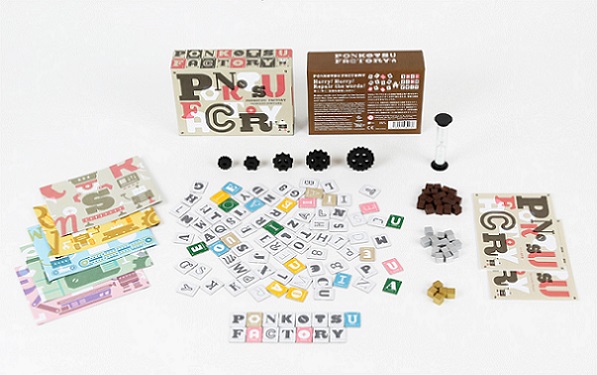Scramble to Put Words Back Together in Ponkotsu Factory

You’re a robot at the word factory. Words come in a jumbled mess and it is your job to put them back together again. Work fast, but be careful. You might have put the letters back together into words, but were they the right words?
Published by Japanese company itten, Ponkotsu Factory is a real-time word game in which players must not only race to make words with the letter tiles given to them, but must attempt to form the same words their opponent originally built.
Gameplay
Each player takes a set of starting letter tiles, one of each vowel. You take completion markers equal to the number of players in the game and set them in the center of the table. Each player also takes a paper and pencil (not supplied with the game) and places them behind their player screens.
At the start of each round, all the letter tiles are placed face-down and mixed up. Each player then takes fifteen of these. Behind your screen you must create three four-letter words, with the use of these tiles and your starting tiles. You then write the words down. Words should not be names or abbreviations, nor can they be plural. Once everyone has finished constructing their words, they mix up the twelve tiles used and pass them to one of the other players. The game is played over four rounds, and each round you pass them to someone else (except of course in a two player game).
Next is the solving phase. Each player takes the twelve tiles they have been passed and attempt to reconstruct the three four-letter words that were originally built. The first player to build the correct number of words announces that they have finished, takes the first completion marker, and then starts the sand timer. The other players have until the timer runs out to continue working on their tiles. Each player who finishes building three four-letter words takes a completion marker. The first marker that is taken is worth points equal to the number of players, the next one to be taken is worth one less, and so on down to the final marker that is only worth one point. If you don’t finish building three words before the timer runs out, you cannot take a completion marker.
After everyone has finished building words with their tiles or the timer runs out, each player checks to see if the words they built matched the words from the original player, and earn one point for each matching word.
Players then take back all their start tiles, all other word tiles are returned to the center of the table and another round begins. The player with the most points after four rounds wins the game.

Review
Ponkotsu Factory is a clever blend of real-time and word game mechanics. Earning points for finishing early during the solving phase is just as important as correctly guessing your opponent’s original words. Trying to come up with words that your opponent is unlikely to guess is also a good strategy, and can lead you to approaching the tiles in different ways.
Trying to come up with three four-letter words, with the help of twenty tiles, isn’t too difficult of a task. The result is a more friendly game for players who typically struggle with word games, but the game does suggest using three-letter words instead if you need to adjust the difficulty.
While the theme isn’t front and center in the gameplay, it is rather fun to imagine the robots scurrying around, trying to reassemble the words, and there are nice touches throughout. The completion markers are shaped like gears, and the design on the letters is diverse and creative. It would have been nice, though, if there was something provided for tracking your words, even if it was only a simple pad and pencils. The English in the rulebook is sometimes a little strange or clunky, making it a little more difficult to understand than it should be, and while it is a minor point it is true that the title doesn’t really translate into English.
Ponkotsu Factory feels like a fresh take on the word game genre. We liked the layers to the gameplay and the fact that speed was as important as the word creation. The rounds are fairly fast, and it’s a nice a touch that each round every player is both building and recreating the words, rather than taking turns with the roles.
Pros: Ability to adjust difficulty, component quality, balance between word game and real-time game
Cons: The rulebook could use some editing, nothing is included in the game to track the words you’ve built
Disclosure: we received a complimentary review copy of this game.






